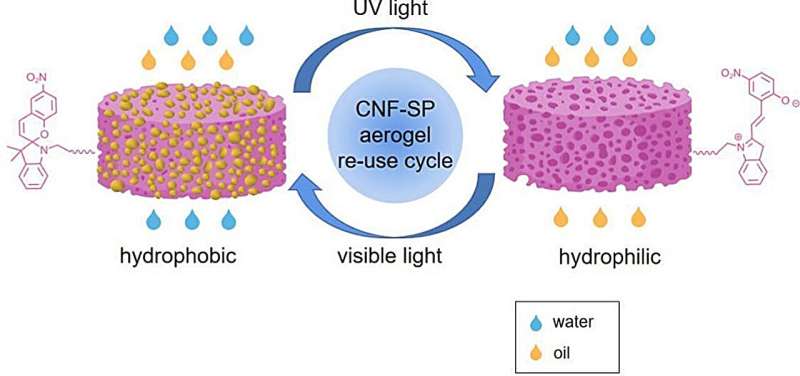This article has been reviewed according to Science X's editorial process and policies. Editors have highlighted the following attributes while ensuring the content's credibility:
fact-checked
peer-reviewed publication
trusted source
proofread
Researchers develop reusable 'sponge' for soaking up marine oil spills—even in chilly northern waters

Oil spills, if not cleaned up quickly and effectively, can cause lasting damage to marine and coastal environments. That's why a team of North American researchers are developing a new sponge-like material that is not only effective at grabbing and holding oil on its surface (adsorption), but can be reused again and again—even in icy Canadian waters.
The findings are published in the journal Science of The Total Environment.
The special material—called CNF-SP aerogel—combines a biodegradable cellulose-based material with a substance called spiropyran, a light-sensitive material. Spiropyran has a unique "switchable" property that allows the aerogel to go between being oil-sorbent and oil-repellent, just like a kitchen sponge that can be used to soak up and squeeze out water.
"Once spiropyran has been added to the aerogel, after each usage we just switch the light condition," explains Dr. Baiyu Helen Zhang, professor and Canada Research Chair at Memorial University, Newfoundland. "We used the aerogel as an oil sorbent under visible light. After oil adsorption, we switched the light condition to UV light. This switch helped the sponge to release the oil."
And the material continues soaking up and releasing oil, even when the water temperature drops, according to Dr. Xiujuan Chen, an assistant professor at University of Texas–Arlington.
"We found that when we tested the oil sorbent's performance under different kinds of environmental conditions, it had a very good performance in a cold environment. This is quite useful for cold winter seasons, particularly for Canada."
The researchers used the CLS's Mid-IR beamline to examine the characteristics of the aerogel before and after exposing it to visible and UV light. From here, the researchers are looking to scale up their research with large pilot studies and even testing the material in the field.
"The CLS has a very unique infrastructure that supports students and researchers like us to conduct many kinds of very exciting research and to contribute to scientific knowledge and engineering applications," says Zhang.
More information: Hongjie Wang et al, Development of a spiropyran-assisted cellulose aerogel with switchable wettability as oil sorbent for oil spill cleanup, Science of The Total Environment (2024). DOI: 10.1016/j.scitotenv.2024.171451
Journal information: Science of the Total Environment
Provided by Canadian Light Source





















